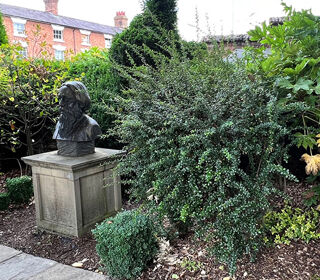
Blog

Find out how we've been working on decolonising Shakespeare through the Shakespeare Birthplace Trust’s collections.
This National Centre for Academic and Cultural Exchange (NCACE) funded project built on the findings of Hopkins’s collaborative doctoral project with BCU and the Shakespeare Birthplace Trust (funded by Midlands4Cities), aiming to determine the best pathways to implementing positive change at the heart of Shakespeare’s cultural iconography: the museum of Shakespeare’s life and times in Stratford-upon-Avon.
As a continuance of the partnership between BCU’s Institute of Media and English and the Trust, the funding enabled the production of a series of reports that translated the academic recommendations of the doctorate into positive and achievable actions with clear objectives, methods, and timelines. The reports reflect the urgency indicated by the prior research to do three principal things: to recognise the role Shakespeare has been forced to play in establishing and upholding imperialistic narratives of cultural supremacy; to purge the Shakespeare Birthplace Trust’s interpretative policies and brand narratives of Anglocentric and colonialist thought; to institute new communicative strategies to address societal inequities that are embedded in imperialism and associated with Shakespeare’s global cultural status.
The reports spotlight the Trust’s sub-collection of objects related to Bengali polymath Rabindranath Tagore, as the research highlighted the ways in which interpretation to date has prioritised Shakespeare’s value as a cultural figure over that of Tagore. The doctoral thesis noted the Trust’s scarce acknowledgement of Tagore’s astonishing body of literary work as well as the circumvention of the British atrocity in Jallianwala Bagh, Amritsar, in 1919 in its explanation for Tagore’s renunciation of his knighthood. The action plan acknowledged the need for a dedicated project that is co-curated with Tagore experts and diasporic community stakeholders to celebrate and honour Tagore through the connections forged by the Trust’s collection, but without prioritising Shakespeare. The project would act as a case study for future decolonial work for the Trust and would mark the beginning of a new relationship between itself and the multicultural and global communities it serves.
The Trust’s eagerness to harness the momentum of the doctoral work indicates the first layer of impact that has been made through this work. A series of funding applications are now in progress to begin the next stage, the Tagore interpretation case study project, which will take the impact beyond the institutional level at the Trust and into its audiences. Those audiences will be enhanced by the community partnerships that are a crucial part of the project as they will ensure the work is truly representative and will help the Trust to engage with people who might previously have found its narratives exclusory and unwelcoming. Furthermore, a Memorandum of Understanding has now been signed between BCU and the Trust as a sign of the benefits and the potential of the relationship between HE and cultural organisations, to enable the translation of complex, and therefore contentious ideas like decolonisation into the public realm. The MoU will help the Trust reach key stakeholders through BCU’s extensive community connections, as well as ensure that the relationship is sustainable and supports the aims of the project as long-term rather than representing a fleeting engagement with the decolonial trend.
An audio recording of a presentation given by Hopkins at the NCACE Festival of Cultural Knowledge Exchange in October 2022 is available here, and the short film produced by Hopkins and Prof. Vanessa Jackson about the Trust and its Tagore collection is available here. Hopkins’s thesis is available on the BCU open access repository here.